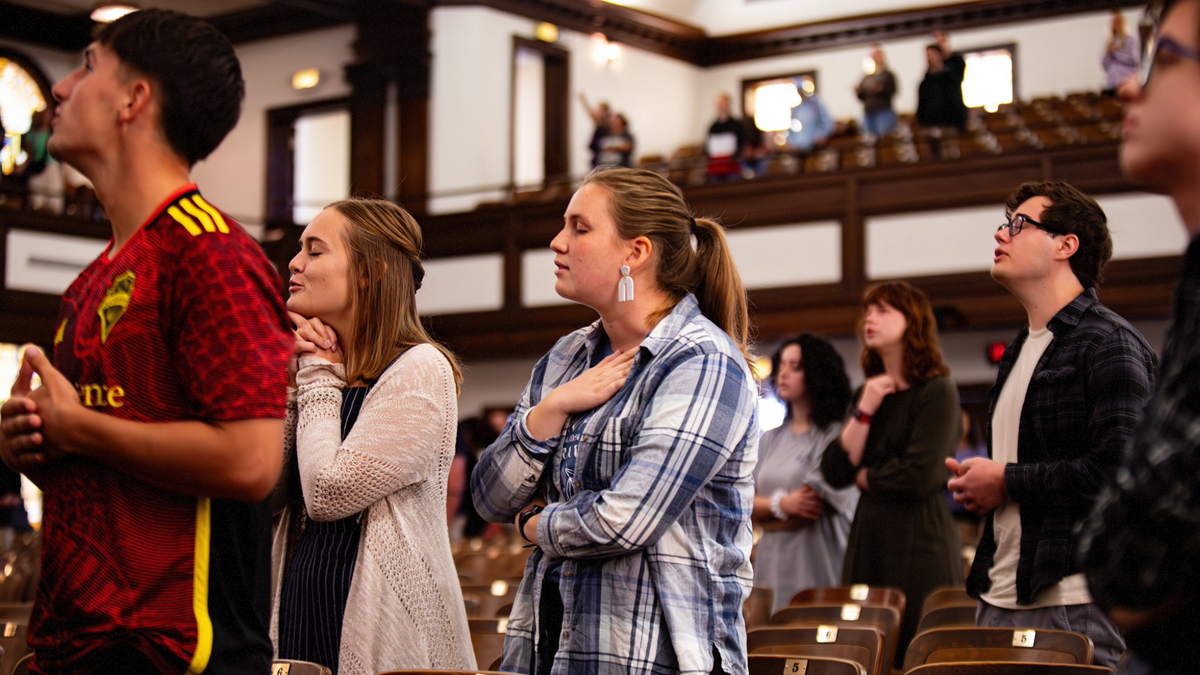College marketers love photos: students in class, students out on the grass—maybe throwing a frisbee, reading a book, or laughing with friends. For a Christian school, any image of someone singing or praying is good. They are always looking for compelling pictures that say to prospective students, This could be you.
And the Asbury revival—the “outpouring” in February 2023, where students in Wilmore, Kentucky, felt moved by the Holy Spirit to stay in chapel and sing, pray, confess, testify, and sing some more for about two weeks—produced lots and lots of compelling photos.
But Jennifer McChord didn’t think she could use them.
When the revival started, the vice president of marketing and enrollment at Asbury University was a year and a half into an intensive digital ad campaign to raise the Wesleyan-movement school’s brand profile. She was trying every way she could to grab the attention of 15-, 16-, and 17-year-olds who loved Jesus and wanted to be challenged in their faith while studying Bible theology, biological psychology, English, health communication, equine science, or any of the other subjects offered at Asbury. Her team wanted to make sure that Christian high school students in the region knew about and seriously considered applying to the school.
But using the photos and videos from the revival for an ad campaign felt like it would be a violation of something special. The administration decided they weren’t going to do that.
“If it seems like we’re trying to benefit from the outpouring, that’s the check,” McChord told CT. “This was not ours. And we don’t take credit.”
From the outside, news that Asbury has record-breaking enrollment this fall seems, kind of obviously, like an outpouring of the outpouring. After all, the revival went viral on social media and grabbed the attention of Christians around the country and the world, right as high school seniors were making decisions about college. It only makes sense to think that Asbury got a Holy Spirit enrollment bump.
“I think people in our community will immediately say it was [the] outpouring,” president Kevin Brown told the Asbury student newspaper.
Internally, however, administrators say the move of the Holy Spirit presented the school with a peculiar marketing challenge. They worried about the real danger of misusing it. Even the act of celebrating what God had done could become cheap and crass, if too directly commercial.
The marketing team, deep into a push to increase enrollment post-pandemic, had to stop and evaluate the ways they were going to represent the outpouring—if they were even going to—in advertising materials. How were they going to avoid misappropriation? How were they going to incorporate it in the story of Asbury’s mission and identity, and talk about it with prospective students and their families?
Before they’d really decided what they were going to do, McChord told CT, they noticed the student-led campus tours started to fill up more than normal. But the “prospective students” turned out not to be prospective students at all. Instead, they were visitors who found they couldn’t get into the chapel, because so many people came to participate in the revival. They were signing up for tours in hopes of gaining access another way. They were disappointed when they found their groups wouldn’t be traipsing through the middle of all the praying and singing.
The university community did a lot of work to protect the outpouring from visitors who seemed like they wanted to hijack it. In the process, they also embraced the idea that the outpouring wasn’t theirs to control. They were caretakers. It was a gift. Any attempt to own it would be wrong.
“We want to be true to how the Holy Spirit showed up,” student life vice president Sarah Thomas Baldwin told CT at the time. “We are seeing the Holy Spirit come upon our students, and we want to honor that.”
Marketing and enrollment decided they needed to adopt the same disposition. When the outpouring came up in plans for promotional efforts, they asked themselves if it seemed like they were trying to benefit from the work of the Holy Spirit. If the answer was yes, they shut it down.
“It’s been a very careful and prayerful process,” spokeswoman Abby Laub said.
The results sometimes felt counterintuitive. As they were promoting the school, counselors and recruiters found themselves on occasion telling people they shouldn’t enroll in Asbury in anticipation of the next outbreak of spiritual fervor.
“We’ve had to correct some people when they say, ‘I can’t wait for the next one’ or ‘I’m excited to get to be part of an outpouring,’” McChord said. “You can pray for that. Be expectant—that’s part of our theology. But we don’t plan it. It’s not on our schedule. We’ve had to have a lot of these conversations.”
At the same time, the marketing team’s big goal with the digital ad campaign and other outreach efforts was to make sure that more people knew about Asbury. The wanted to raise the school’s profile and communicate that this is place where students can earn a good education while also growing spiritually.
The revival got that message out. They just had to accept it as a gift.
“We hold it with both hands,” McChord told CT. “But truly open hands.”
The outpouring also encouraged the marketing and enrollment team to lean in to conversations about the spiritual life at the school.
While prospective students and their parents are, of course, concerned with practical things from degree paths to the quality of the food to potential scholarship packages, they are also interested in Christian formation.
“From a marketing and enrollment standpoint, what the outpouring has allowed us to do is be all-in on who we are at Asbury,” McChord said. “We can really be clear: It is an academically excellent school with spiritual vitality. You will encounter Jesus here. You will learn about God. It will be your decision what you’re going to do with that.”




























![[Video] More – Aghogho » GospelHotspot](https://gospelhotspot.net/wp-content/uploads/2024/04/More-Aghogho.jpeg)
















